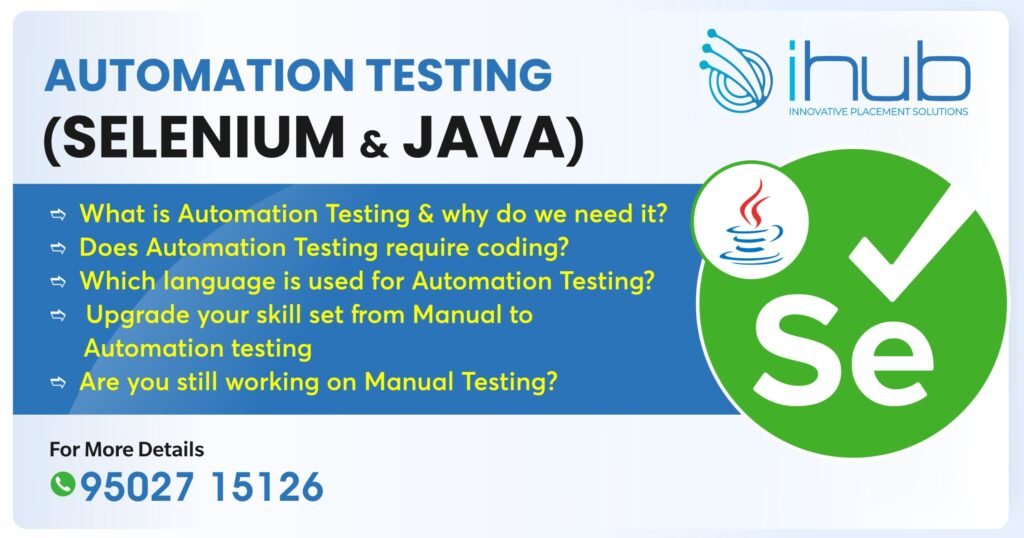Selenium with Java Training

Ihubtalent offers a specialized Selenium with Java training in Hyderabad, combining in-depth theoretical knowledge with practical applications to prepare students for careers in automation testing. As a premier Selenium with Java course institution in Hyderabad, this course begins with Java essentials and covers Selenium WebDriver, advanced frameworks, and real-world test scenarios.
Students will gain expertise in handling web elements, locators, synchronization, and test automation, building a solid foundation in Selenium. The course dives deeper into advanced frameworks like TestNG, Apache POI for data-driven testing, and Page Object Model (POM), along with project management using Maven and CI/CD integration with Jenkins. These skills are essential for developing a full-scale, professional-grade automation testing suite.
Available as both an online Selenium with Java course and an in-person program, Ihubtalent’s training provides flexible learning options to suit different needs. Additionally, our Selenium with Java training includes an internship with real-time projects, offering students hands-on experience and industry insights. With job placement support and expert guidance, Ihubtalent’s Selenium with Java training in Hyderabad ensures students are well-prepared to secure roles in leading companies.
Why Choose iHub Talent for Selenium with Java Training?
Industry-Aligned Curriculum
iHub Talent’s Selenium with Java training in Hyderabad is crafted by experienced professionals to match current industry standards. The curriculum covers everything from core Java basics to advanced Selenium WebDriver techniques, frameworks, and continuous integration tools, ensuring you gain comprehensive automation skills.Expert Instructors
Our trainers are industry veterans with hands-on experience in automation testing. They guide you through complex concepts with real-world scenarios, helping you build a solid foundation in Selenium with Java.Hands-On Learning
The course emphasizes practical training with projects, exercises, and case studies. You’ll work on real-world applications, gaining hands-on experience to build confidence and proficiency in automation testing.Flexible Learning Modes
iHub Talent offers both an online Selenium with Java course and in-person training in Hyderabad. This flexibility allows you to choose a mode that suits your schedule and learning preferences.Internship & Placement Support
We offer an internship program that lets you work on live projects, applying what you’ve learned in real-time. Plus, iHub Talent provides dedicated placement support, helping you prepare for interviews and secure roles in top MNCs.Trusted Training Institution
Recognized as a leading Selenium with Java course institution in Hyderabad, iHub Talent has a track record of success in automation training. Join us to build a rewarding career in test automation!
Selenium With Java Course Content
➡️You will be in a position to pick any website over the internet and can automate it ➡️Implement page object design pattern, data-driven testing, and Cucumber Framework
➡️Learn to use Selenium Grid with TestNG for parallel execution
➡️Understand Selenium WebDriver Architecture
➡️Set up WebDriver project in Eclipse and write test cases using TestNG
➡️Understand how to use Maven and Jenkins
➡️Running our automated test inside a Docker container
➡️Execute a project from scratch by building an automation framework and automating a ➡️few test scenarios
➡️Able to work on Live Projects, Manipulate, complex XPath, and CSS
➡️Able to justify 1-5 years of your existing experience in Selenium
This Course is designed to train freshers and professional testers with the basics of testing web applications using Selenium
➡️You will be in a position to pick any website over the internet and can automate it
➡️Implement page object design pattern, data-driven testing, and Cucumber Framework
➡️Learn to use Selenium Grid with TestNG for parallel execution
➡️Understand Selenium WebDriver Architecture
➡️Set up WebDriver project in Eclipse and write test cases using TestNG
➡️Understand how to use Maven and Jenkins
➡️Running our automated test inside a Docker container
➡️Execute a project from scratch by building an automation framework and automating a ➡️few test scenarios
➡️Able to work on Live Projects, Manipulate, complex XPath, and CSS
➡️Able to justify 1-5 years of your existing experience in Selenium
➡️Manual Testers/freshers
➡️Testers with no java programming
➡️experience looking to gain WebDriver experience.
➡️Fundamentals of Test Automation
➡️What are the advantages of automation testing?
➡️What Selenium is and how it is used in Real-time
➡️Features of Selenium
➡️Installing IDE
➡️Building Test Scripts
➡️Running Test Scripts
➡️Locating Elements on the web page
➡️Limitations of Selenium IDE
➡️Selenium Web Driver Dverview
➡️Configuring WebDriver in Eclipse
➡️WebDriver Architecture
➡️Web Driver Drivers
➡ WebDriverManager
➡️Traditional Locators
➡️Relative Locators
➡️Handling Web elements
➡️Running tests in multiple browsers
➡️ Wait Strategies
➡️Handling AJAX controls
➡️Handling JavaScript alerts,
➡️prompts, and confirmations
➡️Handling Multiple frames
➡️Handling Multiple windows
➡️Capturing screenshots
➡️Browser navigation
➡️Handling Keyboard and Mouse Events
➡️Handling Autosuggestions
➡️Handling Web Tables
➡️Finding Broken Links
➡️File upload and Download using Robot class
➡️How to Install the TestNG plug-in in Eclipse
➡️Various Annotations
➡️Assertions
➡️Writing Selenium test script from scratch
➡️Reports using TestNG
➡️Application Overview
➡️Bank project overview
➡️Project Description
➡️ Tools used in the project
(Jenkins, Maven, GitHub, Docker, and Robot Class)
➡️Roles and Responsibilities
➡️Automation process
➡️Automation life cycle
➡️Identify test cases that are to be automated
➡️ Authoring the scripts
➡️Executing the scripts
➡️Analyze the Reports
➡️Introduction to Various Frameworks
➡️Data-Driven Tests Using POI
➡️Reading, Writing data into Excel
➡️Database Connection (JDBC)
➡️Reading, Writing data into MySQL
➡️Page Object Model Framework (POM)
➡️Writing scripts Using Page Object Model
➡️Configuring Test Suites
➡️Passing Parameters to Tests
➡️Parallel Test Execution Capability
➡️ Re-run failed test scripts
➡️Attributes of @Test
➡️Running TestNG suites from the command prompt
➡️Creating a Maven project
➡️Understanding of POM.xml
➡️ Maven Integration with TestNG
➡️Executing Scripts using the Maven build tool
➡️Overview of BOD, TOD
➡️Cucumber Project Setup
➡️Gherkin Keywords
➡️Working with a simple scenario
➡️Cucumber options
➡️Generating Cucumber Reports
➡️Cucumber Advanced Features
➡️Working with Data table
➡️Page Object Model in Cucumber
➡️Background and Hooks examples in Cucumber
➡️Configuring Jenkins
➡️Executing the windows
➡️commands in the Jenkins Free Style project
➡️Creating Maven Job
➡️ Manage Plug-ins
➡️Scheduling the Jobs
➡️What is Version Control System
➡️What is GitHub
➡️Git commands
➡️Pushing our Project into GitHub
➡️Git vs. GitHub
➡️What is Selenium Grid?
➡️Setting up Grid – Hub, and Nodes?
➡️Running Test Scripts on Selenium Grid
➡️Docker Basics & Installation
➡️Integrate Selenium Grid with Docker
➡️Running our automated tests
➡️inside a Docker container
➡️What is API testing
➡️Advantages of API testing
➡️The Types of API Testing
➡️API testing tools – Swagger Ul and Postman
➡️API Testing Terminology
➡️SOAP vs REST
➡️HTTP Response codes
➡️What is Rest Assured?
➡️Configure in Eclipse
➡️Validate Response Status and Body
➡️ Basic Authentication
➡️What is Java?
➡️Variable and Data type in Java
➡️Operators in java
➡️Control statements
➡️ Strings and Arrays
➡️Advantage of OOPs
➡Classes and objects concepts of classes, objects, Methods
➡️Constructors
➡️Package
➡️Static keyword
➡️This keyword
➡️Overloading methods and constructors
➡️Inheritance, Benefits of inheritance.
➡️Types of Inheritance
➡️Method overriding, super uses
➡️Polymorphism
➡️Encapsulation
➡️Abstract class
➡️Interface
➡️Final Keyword
➡️Access Modifiers
➡️Exception
➡️Types of Exception
➡️Use of try-catch block in Exception handling
➡️Multiple catch block
➡️finally block
➡️throw keyword
➡️throws keywordException
➡️Types of Exception
➡️Use of try-catch block in Exception handling
➡️Multiple catch block
➡️finally block
➡️throw keyword
➡️throws keyword
➡️Hierarchy of Collection Framework
➡️ArrayList class
➡️LinkedList class
➡List Interface
➡️HashSet class
➡️HashMap and HashTable class
➡️Lambda Expression
➡️Method References
➡️Functional interfaces
➡️Streams
➡️Stream filter
